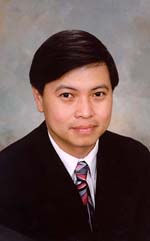 |
Ph.D., IEEE Fellow, IET Fellow
|
Nam Ling received B.Eng. from Singapore, and M.S. and Ph.D. degrees from U.S.A. Since 2010, he is the Sanfilippo Family Chair Professor of Santa Clara University (U.S.A) and the Chair of its Department of Computer Engineering. He was an Associate Dean for its School of Engineering during 2002 2010. Currently he is also Consulting Professor for the National University of Singapore and Guest Professor for Shanghai Jiao Tong University. Prof. Ling is an IEEE Fellow due to his contributions to video coding algorithms and architectures. He is also an IET Fellow. He has more than 150 publications and standards contributions, including a book. He was named IEEE Distinguished Lecturer twice and received the IEEE ICCE Best Paper Award (First Place). He received four major awards from the University (Outstanding Achievement, Recent Achievement in Scholarship, President’s Recognition, and Sustained Excellence in Scholarship) and two awards from its Engineering School (Researcher of the Year and Teaching Excellence). Prof. Ling served as Keynote Speaker (IEEE APCCAS, VCVP, JCPC, and IEEE ICAST), Distinguished Speaker (IEEE ICIEA), General Chair/Co Chair (IEEE Hot Chips and VCVP), Technical Program Co Chair (IEEE ISCAS, APSIPA ASC, IEEE APCCAS, IEEE SiPS, and DCV), Technical Committee Chair (IEEE CASCOM TC and TCMM), and Guest Editor/Associate Editor for journals (IEEE TCAS I and JSPS). He is the General Co-Chair for IEEE ICME 2013 and will serve as Keynote Speaker for IEEE ICIEA 2012 and IET FC 2012. Prof. Ling delivered more than 110 invited colloquia worldwide.
High Efficiency Video Coding and its 3D Extension: A Research Perspective
High Efficiency Video Coding (HEVC) is jointly developed by the Joint Collaborative Team on Video Coding (JCT-VC) of ISO/IEC Motion Picture Experts Group (MPEG) and ITU-T Video Coding Experts Group (VCEG). At the present time, HEVC development is at its finalizing stages and achieving a 50% bit-rate reduction as compared to that of the current H.264/AVC video coding standard. Significant increase in resolution and perceptual quality can be expected for home and mobile video applications with future devices and content using HEVC. Beyond 2D video, the work for the 3D extension of HEVC has begun. In this talk, we will look at HEVC and its 3D extension from a research perspective and discuss future research challenges addressing them. We will explain the essential HEVC coding tools, especially the ones giving high coding gains. We will also discuss key compression techniques related to the 3D extension. Finally, we will highlight some of our current research related to HEVC.